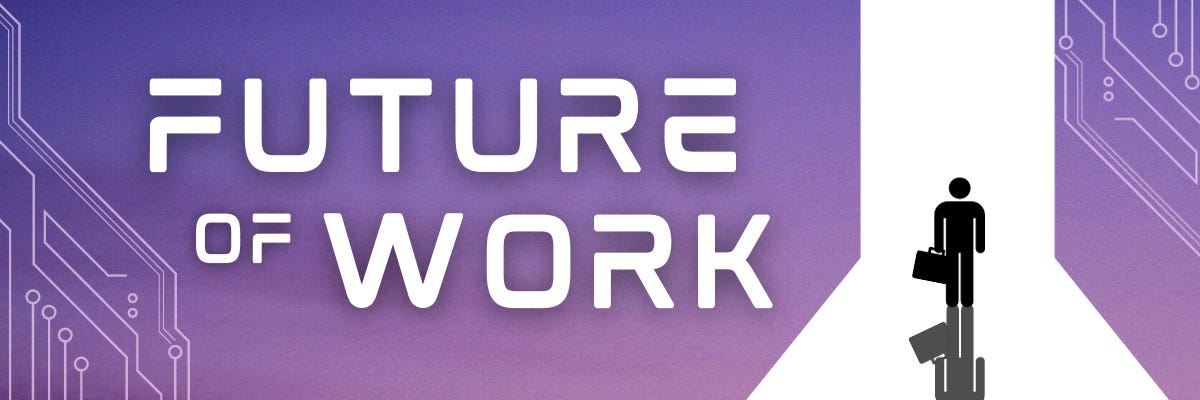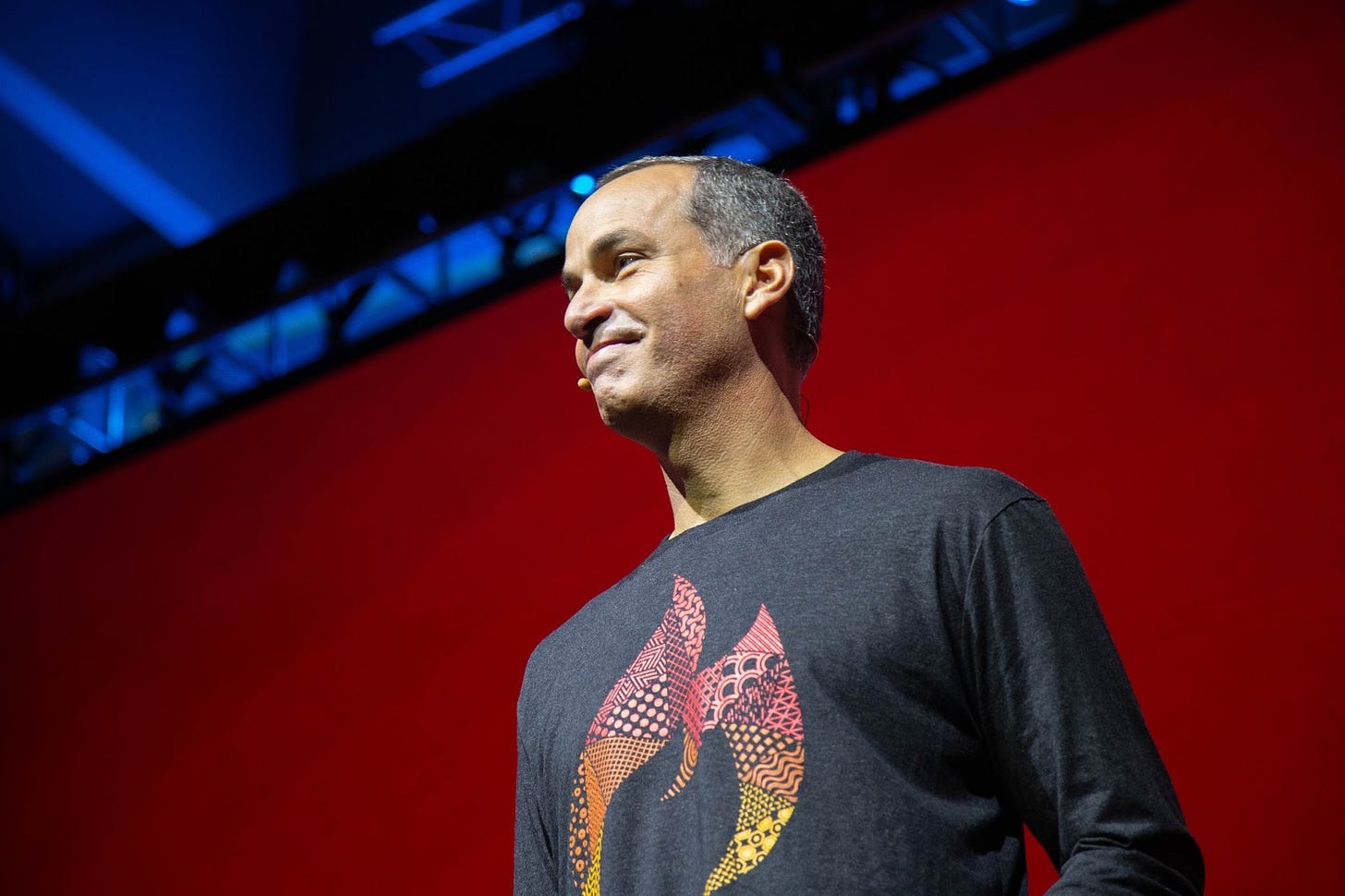For Gen Z, mentoring matters
In an era of remote and hybrid work, companies like Red Ventures are becoming more intentional about spreading expertise to younger employees.
Today, we’re giving our free subscribers a preview of our “Future of Work” series running this week. To read the rest of this series — which examines how workplaces are changing and where they’re headed — you’ll need a paid membership to The Charlotte Ledger. If you don’t have one, sign up here:
This week in The Charlotte Ledger, we’re examining changes in the workplace in a series called “The Future of Work”: What will tomorrow’s workplaces look like? What can workers and employers do to prepare? You’re reading Part 1 of 4.
• TODAY: Younger workers crave mentoring. They don’t always get it.
• WEDNESDAY: Charlotte’s office market is struggling. ‘There’s going to be pain.’
• THURSDAY: The offices of the future will be packed with amenities
• FRIDAY: Small towns in N.C. are pushing to lure remote workers
In their ‘apprenticeship decade,’ young workers value career connections in choosing employers — and deciding whether to stick with them.
by Lindsey Banks
Gen Z craves mentors at work — but they’re not always getting them.
Those born between 1996 and 2010 are predicted to make up nearly a third of the workforce by 2025, according to the World Economic Forum. More so than with other generations, career development and mentorship play key roles in whether they decide to join a company and stay there long-term, the group reports.
But many young workers entered the workforce during the pandemic and have only known “WFH” — or work-from-home — making it difficult to connect with more seasoned colleagues.
Ric Elias, CEO of Fort Mill-based Red Ventures, worries that in today’s remote work environment, important skills are being lost. On an episode of the Peter Attia Drive Podcast recorded in February, he refers to the years between ages 20 and 30 as the “apprenticeship decade,” and how that is affected by remote work and skills that can be learned in-person.
“I worry that we’re going to look back in 10 years and the U.S. would have lost a sense of competitiveness because a lot of these people coming into the workforce are getting a fraction of the tutoring and coaching and experiences and intuition that they would have had,” Elias said, “and 30 [or] 40 years from now, we would have lost a lot of our edge because we stopped investing in the people and their creativity and their skill.”
While schedule flexibility has become a positive aspect of remote working, Elias says, some people are more productive than others in a remote work environment.
“Hybrid, in my opinion, where you’re collaborating with people, where you’re learning experientially, where you’re building intuition, it’s a healthier way to gain expertise,” Elias said.
Red Ventures has launched two mentorship programs to connect younger employees with more experienced ones. Red Ventures CEO Ric Elias (pictured) believes in-person or hybrid work is necessary for young workers to gain expertise. (Photo courtesy of Red Ventures)
The issue has taken on increased urgency since Covid, when remote and hybrid work altered the workplace. While workers of all ages still seek remote positions, Gen Z is the least likely to apply for remote roles — and their interest has been slowing since this time last year, according to a 2023 analysis of applications submitted on LinkedIn.
That reflects their desire for in-person networking and community, the analysis found.
In fact, an Axios survey also found that 41% of younger workers are worried about mentoring possibilities.
In the past few years, Red Ventures has created two mentorship programs for early career professionals, and Gen Z-ers are eager for mentors, said Khalan Boyer, director of diversity, equity and inclusion at Red Ventures. The media company employs around 550 Gen Z-ers in the U.S.
“We found that the mentees really embrace a strong sense of openness and curiosity when it comes to learning and developing their skills,” Boyer said. “We’ve seen that many of them demonstrate a desire to be heard, and I think that’s something you hear about just in general with the Gen Z population.”
In September, computer software company Adobe surveyed more than 1,000 of its Gen Z employees to determine the generation’s workplace behaviors. The survey found that 83% believe that having a workplace mentor is important for their careers, but almost half of the employees surveyed have never had a mentor.
Red Ventures created its Executive Mentorship Program during the pandemic to connect the company’s high performers and historically underrepresented employees with mentors across Red Ventures with transferable skills. The program is for those with over three years of experience in their professional careers and is currently in its third cohort with about 80 participants in total.
“With technology like Zoom, we really had the opportunity to create mentor-mentee pairings with people who may not work in the same office location,” Boyer said. “That’s created a whole new opportunity when it comes to pairing mentees with a mentor who really best fits their developmental needs.”
A second mentorship program emerged at Red Ventures last year, called the Emerging Leaders Mentorship Program, to benefit those within the first three years of their careers. The program provides one-on-one mentorship and workshops for those who are within the first three years of their careers. Its first cohort has a little over 20 mentees, Boyer said.
Now that the pandemic is over, Boyer told The Ledger that most mentor-mentee relationships are back in person, but it’s ultimately left up to the pair to decide what works for them.
“It’s been really nice because I know certain folks, depending on their personality, might find working remotely can be isolating at times,” Boyer said. “Having programs like this that cater and support in-person as well as remote, like a hybrid program, really creates that space for connection outside of just one’s team.”
Charlotte resident Allen Viancourt, 27, is the business development manager for Networking Essentials, a Charlotte-based IT support and cybersecurity company. Viancourt, who works both in person and remotely, quickly learned that he couldn’t work from home every day.
When looking for someone to serve as a mentor, he wants an in-person relationship.
“Those micro-interactions, you miss,” Viancourt said, “and those are just a great way to learn.”
Viancourt was the first sales representative hired at his company, so he values advice and expertise coming from those who have more experience.
“With this job in particular, I’m doing things that I have not done before, so I’m learning on the job,” he said. “That’s awesome, but it's nice to be able to pick off other people.”
Mentees are valuable to their mentors, too: The relationship between mentors and mentees has changed over the years, and not just because of remote working.
Mentorships today are more mutually beneficial to both the mentor and mentee, which hasn’t always been the case, Boyer said.
“I would say 10 or 20 years ago, that was most likely less common,” she said. “I think a lot of the learning typically was one-sided with the mentee doing most of the learning.”
The Hartford, a Massachusetts-based insurance company, was ahead of its time. For nearly 10 years, the company has offered a reverse mentorship program in which an early career employee serves as a mentor to an executive to help them learn new technologies and social media platforms that are relevant to the workplace.
Not only are senior managers learning valuable skills, but younger employees feel heard and respected.
Boyer added: “Gen Z really understands that there's teaching on both sides, and there’s learning on both sides.”
Lindsey Banks is a staff reporter for The Ledger: lindsey@cltledger.com
—
How to work with colleagues from different generations
Here are some tips if you’re working with colleagues older or younger than you, from the Harvard Business Review:
Avoid stereotyping. Just because a colleague belongs to a certain generation doesn’t mean they’re “lazy” or “averse to change.”
Respect boundaries. Topics that were once considered taboo, like mental health and gender roles, may still be uncomfortable for some people to talk about, so approach conversations with respect and sensitivity.
Make conversations inclusive. Let everyone have space to voice their ideas and opinions, even if you have to go out of your way to include them.
Communicate your preferences with your colleagues. Be open about what forms of communication work best for you (texts, emails, phone calls or in-person meetings).
—
The Ledger’s “Future of Work” series was edited by Doug Miller, former investigations editor for McClatchy Southeast and current owner of Miller Swimming. Our regular newsletters will return next week.
In brief
Redistricting lawsuit: A new federal lawsuit alleges that the General Assembly improperly drew lines for new Congressional districts by intentionally discriminating against minority voters. House Speaker Tim Moore, a Republican, predicted courts would uphold the districts and called the suit “a desperate attempt to throw chaos into North Carolina’s elections.” (WRAL)
Car crash kills 1 high school student, injures 2: A Rocky River High School student was killed and two others were seriously hurt in a crash in Mint Hill on Monday morning. Charlotte-Mecklenburg Schools identified the student who died as Jovany Escamilla-Salinas, age 18. A 16-year-old girl and a 17-year-old girl were in critical condition. Separately, a 14-year-old Garinger High student died Sunday after being shot in the head north of uptown. (WBTV)
New mayor pro tem: By a 7-4 vote on Monday, the newly sworn-in Charlotte City Council selected Danté Anderson for the leadership role of mayor pro tem, who presides over council meetings in the mayor’s absence. Anderson, who was elected last month to her second term on the council, represents a district that includes Dilworth, NoDa, Plaza-Midwood and part of uptown. (WSOC)
NCDOT study backs rail yard expansion: A new analysis by the N.C. Department of Transportation says abandoning plans to expand a train maintenance yard in South End “is not prudent or feasible” because of the costs. Residents and city leaders have been concerned about the planned expansion, which they say will slow development and create noise. (Biz Journal, subscriber-only)
Embezzlement report: Two days after firing its founder, K-12 charter school Corvian Community School reported to police that an employee made $50,000 in unauthorized credit card charges for clothes, a hotel room and a helicopter ride. The woman’s lawyer said she paid for her personal expenses using a card that was available to both her and the school. (WFAE)
Democratic Jewish caucus approved: The N.C. Democratic Party voted on Sunday to recognize a new Jewish caucus, three weeks after initially voting not to recognize it, in a vote that highlighted some of the party’s divisions over Israel and Palestine. (WRAL)
Need to sign up for this e-newsletter? We offer a free version, as well as paid memberships for full access to all 4 of our local newsletters:
➡️ Opt in or out of different newsletters on your “My Account” page.
➡️ Learn more about The Charlotte Ledger
The Charlotte Ledger is a locally owned media company that delivers smart and essential news through e-newsletters and on a website. We strive for fairness and accuracy and will correct all known errors. The content reflects the independent editorial judgment of The Charlotte Ledger. Any advertising, paid marketing, or sponsored content will be clearly labeled.
Like what we are doing? Feel free to forward this along and to tell a friend.
Social media: On Facebook, Instagram, Twitter and LinkedIn.
Sponsorship information/customer service: email support@cltledger.com.
Executive editor: Tony Mecia; Managing editor: Cristina Bolling; Staff writer: Lindsey Banks; Business manager: Brie Chrisman, BC Creative




